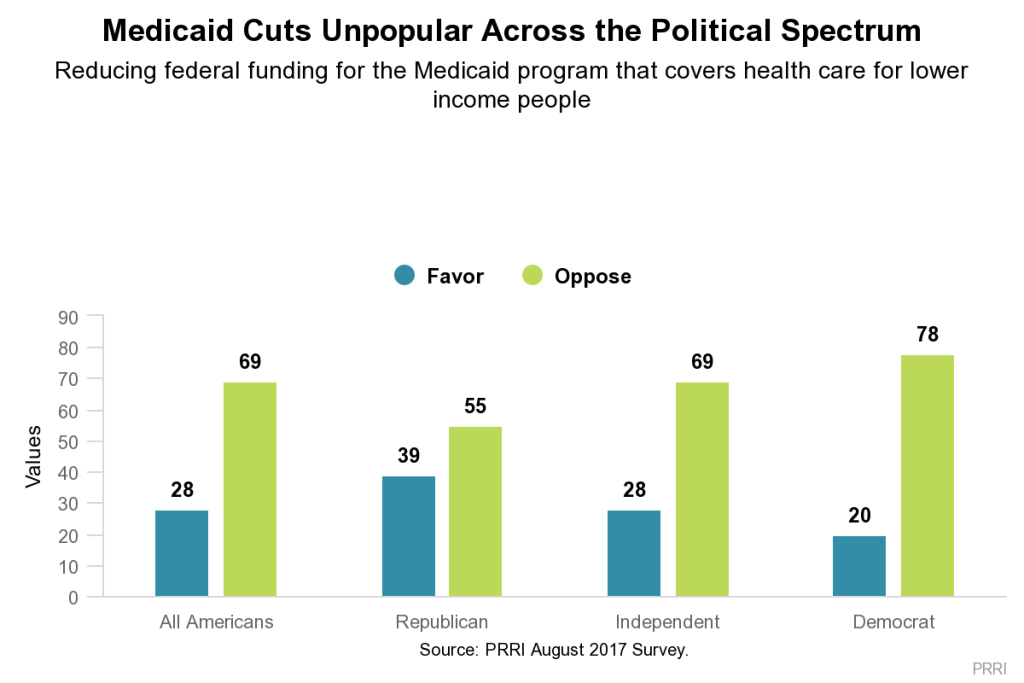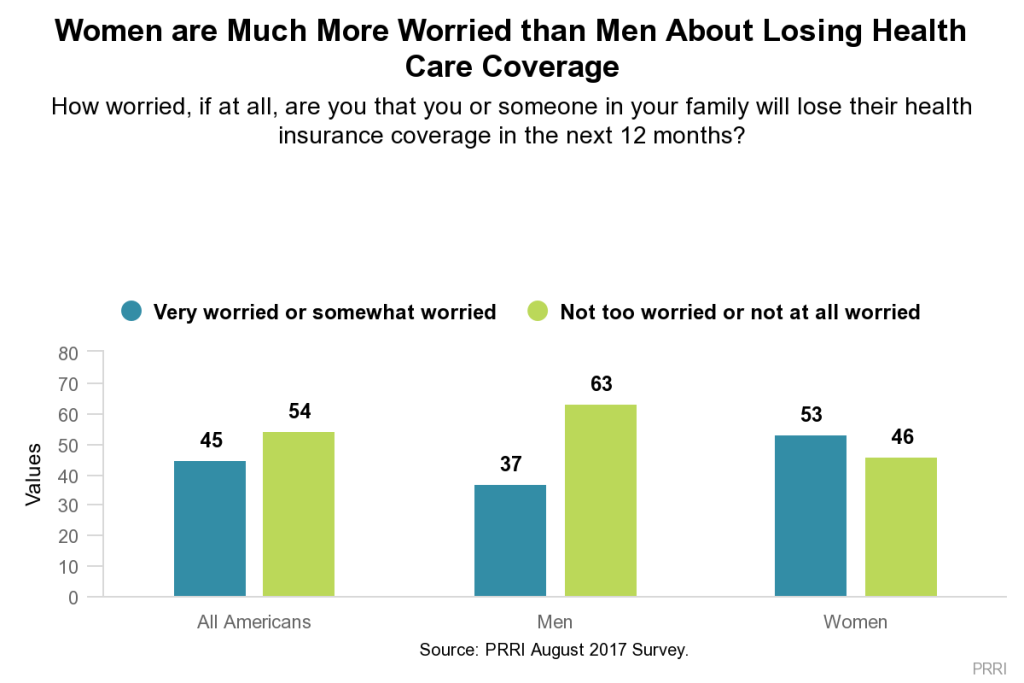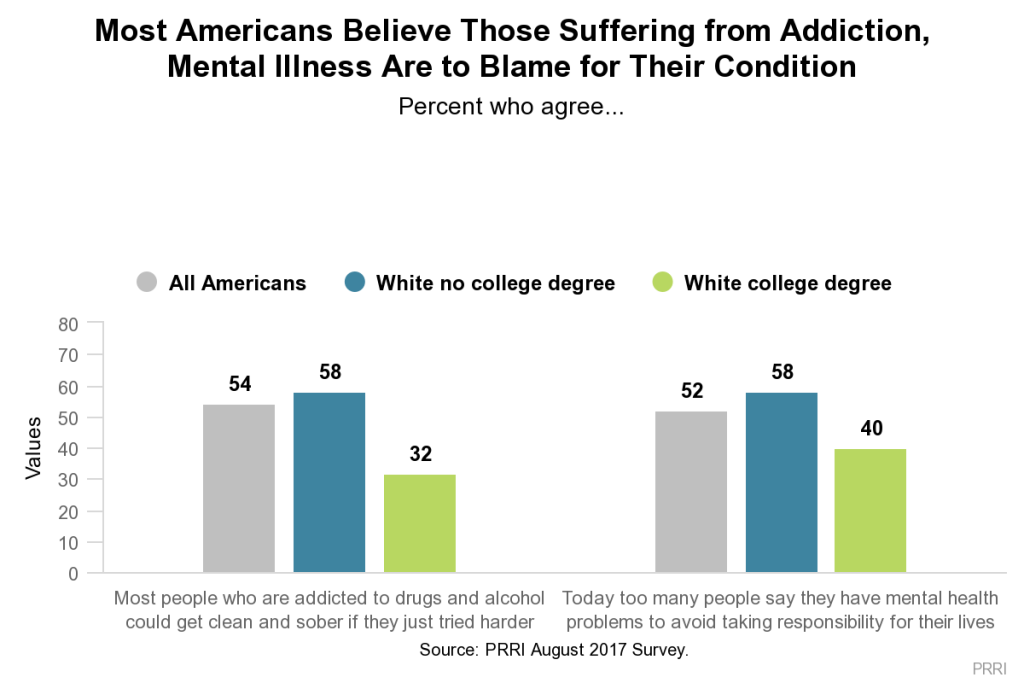Most Americans Oppose Medicaid Cuts
Americans largely reject proposals that would reduce federal funding for Medicaid, the program that covers health care for lower income people. Nearly seven in ten (69%) Americans oppose reducing federal funding for Medicaid, including nearly half (46%) who strongly oppose this type of budget cut. Fewer than three in ten (28%) Americans favor reducing federal funding to Medicaid.
There is no discernable racial gap in opposition to cutting Medicaid. Roughly seven in ten of white (69%) and nonwhite Americans (68%) oppose such cuts, while 28% of both whites and nonwhites support cutting federal funding for Medicaid. Among whites, there is a notable difference by education. Nearly two-thirds (66%) of whites without a college degree oppose federal budget cuts to Medicaid, while more than three-quarters (77%) of whites with a college degree say the same.
At a time of strong partisan divisions over health care, there is political consensus in support for protecting federal Medicaid funding. A majority of Republicans (55%), independents (69%), and Democrats (78%) oppose such cuts. Notably, six in ten (60%) Democrats strongly oppose reducing federal funding to Medicaid.
 There is strong opposition to Medicaid cuts among both men and women. More than six in ten (64%) men and approximately seven in ten (72%) women oppose such spending cuts.
There is strong opposition to Medicaid cuts among both men and women. More than six in ten (64%) men and approximately seven in ten (72%) women oppose such spending cuts.
Nearly Half the Public is Worried About Losing Health Care Coverage
Many Americans express concerns about whether they or a member of their family will lose their health care coverage in the next 12 months. Close to half (45%) of Americans say they are somewhat or very worried that they or someone in their family will lose their health insurance coverage in the next year. Fifty-four percent of Americans say they are not that concerned about the prospect of losing their health insurance coverage.
Partisan divisions are stark. While fewer than three in ten (28%) Republicans report being at least somewhat worried that they or someone in their family will lose their health insurance in the next year, nearly half (47%) of independents and a majority (55%) of Democrats say the same.
Women express far more concern than men about whether they themselves or a family member could lose their health insurance. A majority (53%) of women say they are at least somewhat concerned that they or one of their family members will lose their health insurance coverage in the next year, while only 37% of men say the same. Nearly one-third (31%) of women are very worried about this possibility.

Who’s to Blame: Feelings about People Suffering from Addiction, Mental Health
Poor Lifestyle Choices
Despite support for government health care programs like Medicaid, Americans tend to place responsibility for serious health conditions, including addiction and mental health problems, on the individuals affected. More than six in ten (61%) Americans agree that most serious health conditions can be traced back to people making poor lifestyle choices. Fewer than four in ten (37%) disagree.
Although there are some differences of opinion along partisan lines, majorities of Republicans (74%) and Democrats (60%) agree that most serious health conditions can be traced back to poor lifestyle choices.
No religious group is more likely to blame poor lifestyle choices for serious health conditions than white evangelical Protestants. More than seven in ten (71%) white evangelical Protestants say serious health problems are generally the result of people making bad lifestyle decisions. Roughly six in ten Catholics (61%) and white mainline Protestants (59%) and a majority (53%) of religiously unaffiliated Americans also agree.
White Americans are somewhat less likely than nonwhite Americans to agree most serious health conditions can be traced back to lifestyle choices, although majorities of both groups affirm this idea (57% and 67%, respectively).
Most Americans Say Sobriety is a Matter of Personal Effort
Americans are more likely than not to agree that addiction is largely driven by individual choices and effort. A majority (54%) of Americans say most people who are addicted to drugs and alcohol could get clean and sober if they just tried harder, while roughly four in ten (43%) disagree.
There are significant differences in perceptions of addiction by race and class. More than six in ten (63%) nonwhite Americans agree most people with addictions could get sober if they just tried harder. White Americans are divided on the issue (48% agree and 49% disagree). However, there are notable divisions among whites by educational attainment. Only about one-third (32%) of whites with a college degree believe addicts could become sober if they put forth enough effort, while nearly six in ten (58%) whites without a college degree say the same.
The views of partisans also vary significantly. More than six in ten (62%) Republicans and a majority of independents (53%) agree getting clean and sober is a matter of effort. Democrats are more divided: Half (50%) believe sobriety is possible with enough personal effort, while close to half (45%) disagree.
 Mental Health Problems and Personal Responsibility
Mental Health Problems and Personal Responsibility
Americans believe that too many people use mental health as an excuse rather than taking responsibility for their personal decisions. A majority (52%) of Americans agree too many people today say they have mental health problems to avoid taking responsibility for their lives, while about four in ten (43%) disagree.
Majorities of both white and nonwhite Americans agree mental health issues are often used as an excuse to avoid taking responsibility (52% and 54%, respectively). Again, considerable educational differences emerge among whites. Nearly six in ten (58%) whites without a college degree agree that too many people use mental health issues to avoid responsibilities, compared to only 40% of whites with a college degree who say the same.
Partisan divisions on perceptions of mental health are larger than those seen on physical health. About two-thirds (64%) of Republicans agree too many people say they have mental health issues to avoid responsibilities, compared to 42% of Democrats. A majority (54%) of Democrats disagree that people with mental health problems are using them as an excuse. Views of independents largely reflect the population as a whole.
The views of men and women differ modestly. A majority (55%) of men and nearly half (49%) of women agree that too many people say they are suffering from mental health issues in an attempt to avoid taking personal responsibility for their decisions.
Recommended Citation
Jones, Robert P., Daniel Cox, Molly Fisch-Friedman, and Alex Vandermaas-Peeler. “Most Americans Oppose Medicaid Cuts; Nearly Half Worried about Losing Health Care.” PRRI. 2017.